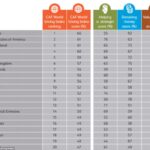Complaining about other generations is so commonplace it has become cliché.
“Kids these days are so entitled.”
“The older generation is so out of touch.”
It’s nothing new, but it’s time for us to stop. Each generation needs to quit fighting and hating on each other. We are all guilty of it, but that doesn’t make it productive or even acceptable. After all, when it comes down to it, every generation truly wants the same things.
What’s the Real Difference?
When Baby Boomers came into the job market, the economy was entirely different. They got a good job, with good pay, and that was enough – or at least it was expected to be.
Many Baby Boomers feel they “settled” for that good job because it was practical. They were glad to have a job with benefits. But they weren’t necessarily pursuing their passions. If you got a job working third shift that allowed you to put a roof over your head and food on the table, then you had achieved the American Dream.
But the American Dream has changed and the economy has changed right along with it. Yes, Millennials want a roof over their heads and food on the table. But they are driven to get more than just a paycheck out of their job. Instead, they want a career where they can feel fulfilled and this is transforming the economy.
The workforce that Millennials are entering is not dominated by a few large corporations in each industry, as it was for Baby Boomers. Instead, the job market is filled with competitive tech jobs and startups.
A high school diploma and strong work ethic are not enough to land you an interview, let alone a job anymore. Millennials need a college degree to even be considered for an entry-level position in the technology industry.
But that doesn’t mean Millennials don’t value work ethic. They work hard, but what that looks like in today’s market is a far cry from what it looked like when Baby Boomers were first entering the workforce.
Millennials are digital. All the advantages of tech growth over the past 15 years? Those advantages belong to the Millennials who have grown up with technology and are therefore able to adapt to innovations and change with an ease that most Baby Boomers just don’t achieve.
They hold themselves to high standards and are unafraid of judging leadership by those same measures. They understand the value of a positive corporate culture and will speak up to improve culture.
It’s Not Just Beer and Ping Pong Tables
When Millennials talk about corporate culture, it’s not uncommon for Baby Boomers to brush it off.
A stereotype has taken hold that positive corporate culture is shorthand for having game tables in the break room and after work gatherings with booze.
While these fringe benefits are nice – even Baby Boomers can enjoy a game of ping pong with a cold beer in their hand – they are not the most important benefits to Millennials, despite what you may have read on the internet.
Everyone, Baby Boomers, Millennials, and even the Gen Xers caught between them, should have healthcare. Everyone should have paid parental leave. Everyone should have opportunities for growth that are supported by honest, constructive feedback from their managers.
Everyone should be able to work together on a team because, at our core, we all want the same things – to succeed in our work and have time left to spend with our loved ones at the end of the day.
Conclusion
We may all want the same things, but Millennials learn far differently than Baby Boomers. Think about it – they grew up with technology. They have nearly always had access to more information than anyone could possibly retain.
Thanks to technology, Millennials have learned that knowing the answer is less important than knowing how to find the answers. Baby Boomers on the other hand, did not always have the answers at their fingertips, so they learned how to memorize and retain facts in an entirely different manner.
Conversations about these differences shouldn’t be a competition or an argument about which way of learning is better. Instead, we need to change our mindset. Millennials and Baby Boomers can work on a cohesive team together, each attacking a problem from their own angle.
The best way to encourage a team mindset is to find the common ground and believe it or not, charitable giving just may be that common ground. Baby Boomers and Millennials both give to charitable organizations, but as with everything else, they do it completely differently.
Baby Boomers are more likely to give to local religious organizations first and then large, well-known charities such as United Way or the March of Dimes. Millennials prefer to give to smaller, secular organizations or crowdfunding campaigns that support a specific cause or even individual.
So how do you bridge the divide in giving practices to find common ground? You begin by trying to understand Millennials and how their commitment to charity will soon alter the landscape of corporate social responsibility programs.
Our eBook, Millennials and the Future of Workplace Giving is full of information, statistics, and best practices advice to help you turn your corporate social responsibility program into a common ground of workplace given that everyone, Baby Boomers and Millennials alike can get behind.



































































































































